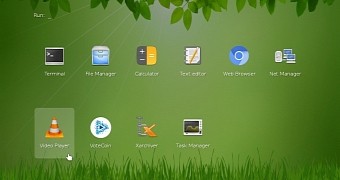Slax Linux developer Tomas Matejicek announced the release of Slax 9.7.0, a maintenance update that makes Slax even smaller than it already is and improves support for new USB devices.
Probably the biggest change of the Slax 9.7 release is that the tiny GNU/Linux distribution is now even smaller as the developer managed to compress the SquashFS filesystem using 1MB blocks instead of the older 512K block size, which is still supported for compatibility with old modules. Due to this small change, the ISO image is now with 10MB smaller than previous releases.
Another interesting change implemented in Slax 9.7 is an updated "slax activate" command that's now capable of copying modules to your computer's RAM only if required, which means that Slax will no longer copy all activated modules, including those downloaded from Internet and stored in user's Home directory, to RAM or to the USB flash drive when powers up.
"Slax is a modular operating system, and it supports on-the-fly activation of modules," explains developer Tomas Matejicek. "Previous Slax version copied all activated modules to RAM or to the USB device it was started from, even if it was not really necessary. Starting with this Slax release, the copying is done only if it is needed."
Better support for newer USB devices
Lastly, the Slax 9.7.0 release introduces the usb-modeswitch tool to improve compatibility with newer USB drives that contain proprietary Windows drivers needed to make the flash drive act like a storage device. Therefore, when writing the Slax ISO image to such USB drives, you won't see the standard "usb-storage" when mounting the stick and the default file manager will fire up with the Slax live drive.
Also added in Slax 9.7 is the pm-utils package, which can be used to run user-supplied scripts on resume and suspend, and the default hostname is now set to "slax" in the /etc/hosts file. You can download Slax 9.7.0 right now if you want to try this tiny and modular Debian-based GNU/Linux distribution. This release is synced with the upstream Debian Stable software repositories.

 14 DAY TRIAL //
14 DAY TRIAL //